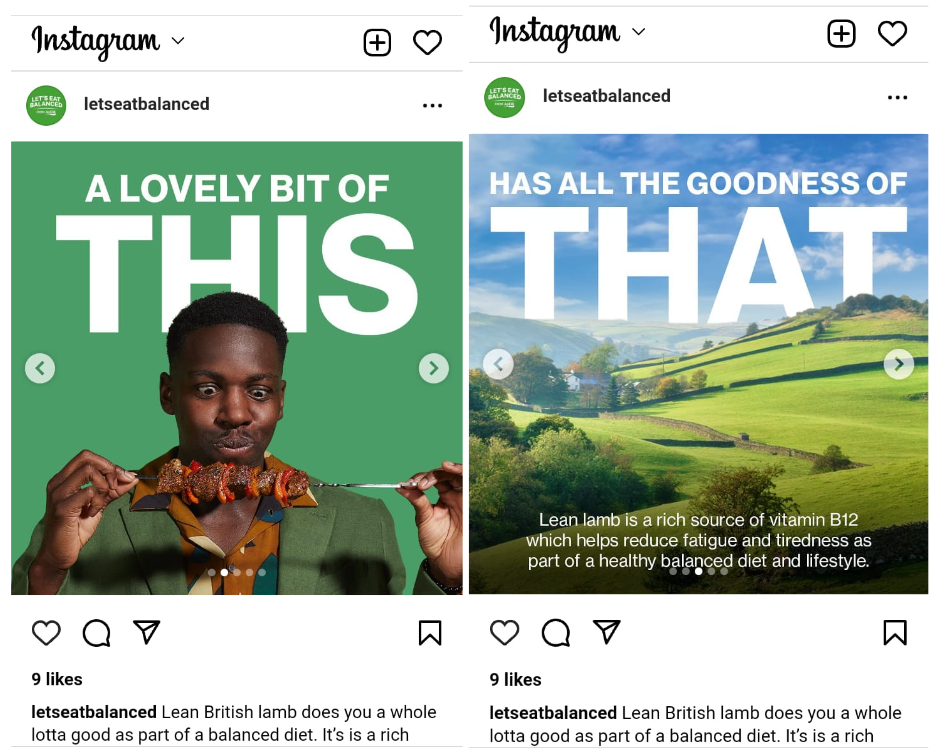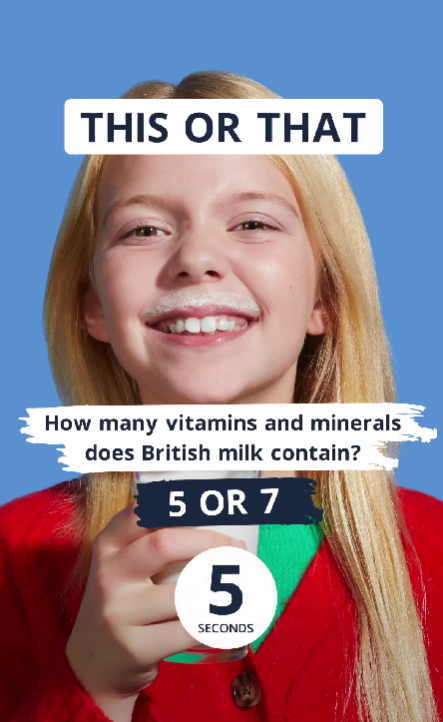A £4-million multimedia ad campaign aimed at boosting British meat and dairy consumption among Gen Z “flies in the face of science”, experts have warned.
Timed to coincide with Veganuary – the popular January campaign to promote plant-based eating – “Let’s Eat Balanced” will target cinema screens, TVs, newspapers, social media channels and major supermarkets over the next two months, to communicate health benefits of lamb, beef, pork and dairy produce.
The advertising blitz includes short trailers voiced by actor and comedian Richard Ayoade. Beaming children and young adults are seen feasting on “British” kebabs and smoothies, and promote meat and dairy as “goodness” and “a lovely bit of that”.
The annual campaign was developed by Ogilvy, which counts BP as a former client, and is run by the Agriculture and Horticulture Development Board (AHDB). The board itself is appointed by the Department for Environment, Food and Rural Affairs and largely funded by levies paid by farmers. It spends almost ten percent of total levies on the pro-meat campaign each year.
The AHDB has said it is partnering with the Instagram, TikTok and Snapchat account Tasty UK – which has an estimated 18 million young adult users monthly – to share ads “geared towards a younger audience”.
The adverts promote vitamin B12, which is contained in meat and dairy (as well as some plant-based foods such as fortified cereals, marmite and nutritional yeast), as a way to “reduce tiredness and fatigue while supporting the immune system”.
However, scientists say the ads deliberately ignore the health benefits of reducing meat and dairy intake, as well as the disproportionately large environmental impact of UK diets. Britons consume four times as many animal products as people in Haiti and ten times as much meat and dairy as those in Mozambique, two countries most affected by climate change worldwide.
Nearly half of diet-related greenhouse gas emissions in the UK come from meat and dairy due to emissions of methane, an extremely potent greenhouse gas, in livestock farming. The Climate Change Committee, the government’s expert advisory body, says reducing meat and dairy consumption by 20 percent by 2030, and 35 percent by 2050, is essential to reaching the UK’s legally binding climate targets.
“A nutritional argument for contemporary levels of meat consumption in countries like the UK flies directly in the face of science,” said Tony Weis, professor of geography and environment at the Western University in Canada, who has written extensively about the rise in meat-heavy diets in recent decades.
Weis pointed to the landmark 2019 report by the EAT-Lancet Commission, a panel of 37 experts on health, sustainability and agriculture, which recommends significant reductions in meat and dairy in the Global North to ensure healthy diets globally while curbing major damage to the planet.
“There is overwhelming scientific evidence that meat-heavy diets in countries like the UK are related to increased risks of non-communicable diseases,” he said.
Defra declined to comment on the content or funding of the adverts, referring DeSmog to the AHDB. The AHDB did not respond to DeSmog’s request for comment.

Targeted Ads
Now in its fifth year, the campaign expects to reach nine in every 10 adults by the end of February. It focuses on winning over the younger generation, particularly Generation Z, which encompasses those aged between 11 and 26 years old.
Figures for the cost of this year’s campaign have not yet been published, and the AHDB had not responded at the time of publication. Last year, the campaign cost £4 million, and £3.5 million in 2021.
The advertising blitz appears to have had considerable impact. Market research commissioned by the AHDB in 2020, obtained by DeSmog via a Freedom of Information request, found that those most exposed to the campaign were 11 percent more likely to buy meat in their next shop.
“Our partnership with Tasty UK to create ‘Balanced Bites’ videos will encourage the younger (18-25 years) audience to create healthy, balanced dishes using British red meat and dairy,” said Carrie McDermid, the AHDB’s head of domestic marketing, in an article on its website.
“Let’s Eat Balanced aims to capture consumers at every touchpoint, with its vibrant colours and streamlined design catering to a broad demographic, especially appealing to the younger Gen Z audience.”
The campaign has been the subject of ongoing controversies since its launch in 2019, and was subject to a complaint in 2021 over claims its advertising was “misleading”. The complaint was not upheld.
Veronica Wignall from campaign group Ad Free Cities said the promotion of meat and dairy to Gen Z resembled “a playbook strategy from the fossil fuel industry”. In 2023, DeSmog found that over 100 influencers had been paid to promote fossil fuel firms since 2017, reaching billions of people.
“Let’s Eat Balanced is targeting younger audiences to override their widespread climate concerns,” she said, accusing the adverts as posing as a “public information campaign”.
“Younger people are more vulnerable to advertising – particularly on social media where influencers can be very persuasive.”

‘Insidious’
British supermarkets have also been criticised for “lending their name” to the campaign.
Sainsbury’s, Waitrose, Co-op, Tesco, Aldi, Morrisons and Lidl are all supporting the adverts, according to the AHDB, with sales materials on fridges and on-pack stickers in stores as well as on their websites.
Estimates by environmental campaign group Feedback found that at least a third of supermarkets’ greenhouse gas emissions come from their sales of meat, dairy and other animal-based products.
“Supermarkets’ involvement in the campaign shows they aren’t serious about net zero,” said Feedback’s food and climate campaigner Liam Lysaght.
None of the retailers responded to DeSmog’s request for comment.
Lysaght described the adverts as “an insidious and irresponsible attempt to prop up a highly-polluting industry”.
“These adverts are constructed to exploit the holes in the Advertising Standards Authority (ASA)’s growing regulation of environmental claims, by packaging advertisements for meat and dairy in general guidance for healthier diets,” he said.
“This new Trojan horse advertising campaign hijacks the language of dietary guidelines, but will only push the public even further from balanced and sustainable diets.”
Edited by Phoebe Cooke
Subscribe to our newsletter
Stay up to date with DeSmog news and alerts







